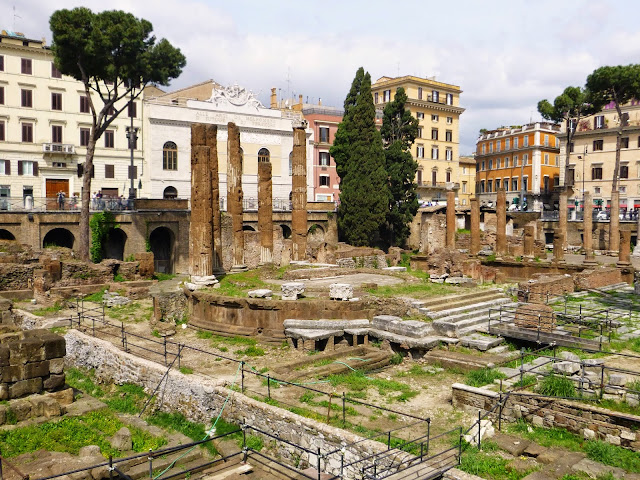Ah, and what history there is there. We have deeds pious and villainous stretching all the way back to the grand days of the Roman Republic. There are still some serene but vaguely sinister types lurking about the place, but I shall get to the cats a bit later.
It was already known that there were two Republican era temples on the site when urban renewal projects in the 1920s began. They kept hitting more and more archaeology, to the point that even Mussolini - who seldom let a few old stones stand in the way of his plans - gave up and just dedicated the site as an archeological park. There ended up being a total of four temples, with the likely dedications being to the "Temple of Today's Fortune", to a goddess named "Feronia", to the "Lares Permanarii" and to either "Juturna" or "Juno Curitis".
Three of the four deities so recognized were water related, and ancient records indicate that the official who supervised the aqueducts had his headquarters here. Right around the corner stands another structure associated with the free distribution of grain.
Along the western side of the Largo Argentina complex stood the Curia of Pompey, which is where Julius Caesar met his end on the Ides of May in 44 BC. The presumptive site has been identified in recent years but is not publicly marked. I suspect they don't want flowers, coins and other memorials tossed onto the site.
In the way of more recent misdeeds, the upper levels of the site contain the ruins of a church built in the 9th century. It was called Saint Nicolo dei Calcari, and was a parish church for the guys working so hard to turn ancient marble statues and inscriptions into nice new lime by burning it in kilns. Darn 'em.
A few pictures of Largo Argentina in the spring of 2015.
The site has been bashed about a bit over the millenia. Fires destroyed the area more than once. Later buildings were put in on top. Don't get me going on about those lime kilns. The fact that it looks this nice is probably due to a combination of factors. The Campus Marti region was one of the few parts of Rome that was never entirely abandoned. Its water supply was not dependent on the severed aqueducts so medieval buildings surrounded and to some extent protected the ancient structures. Oh, and recall that if Mussolini didn't like how things looked he just had his guys improve things a bit.
Recent accounts of the "discovery" of the exact site of Caesar's assassination make their case by indicating that a square bit of stone work - presumably the base for a commemorative statue put up by Augustus - were found near the entrance to Pompey's Curia. This is where the Senate was meeting because the official Senate building had been, well, burned down by and angry mob. If you like the notion of Caesar falling near the entrance to the building, this would be about the right spot. In this picture look for the white square this side of the tall tree in roughly the middle of the image. Now don't go throwing swag down there.
The church of the lime makers has survived the years fairly well.
Ah yes, I promised cats. Well, if you are the kind of person who enjoys felines and ruins - and you know who you are - this is the place for you. The entire city of Rome is a sort of unofficial cat sanctuary. I understand that there is a law that if an area has a certain number of resident cats then they have to be left alone. The Largo Argentina site is closed to the public apart from the rare tours that are allowed. The stray cats just settled in. Eventually a volunteer organization was formed to take care of them. They get fed, neutered, put up for adoption. The cats have run of the place while we have to look over the fences:
Hey, I am not a cat lover. But I do recognize in them a certain inner calmness that serves them well. As I am anticipating a rather stressful week I will - most atypically for me - also feature cats in my Wednesday and Friday posts.







No comments:
Post a Comment